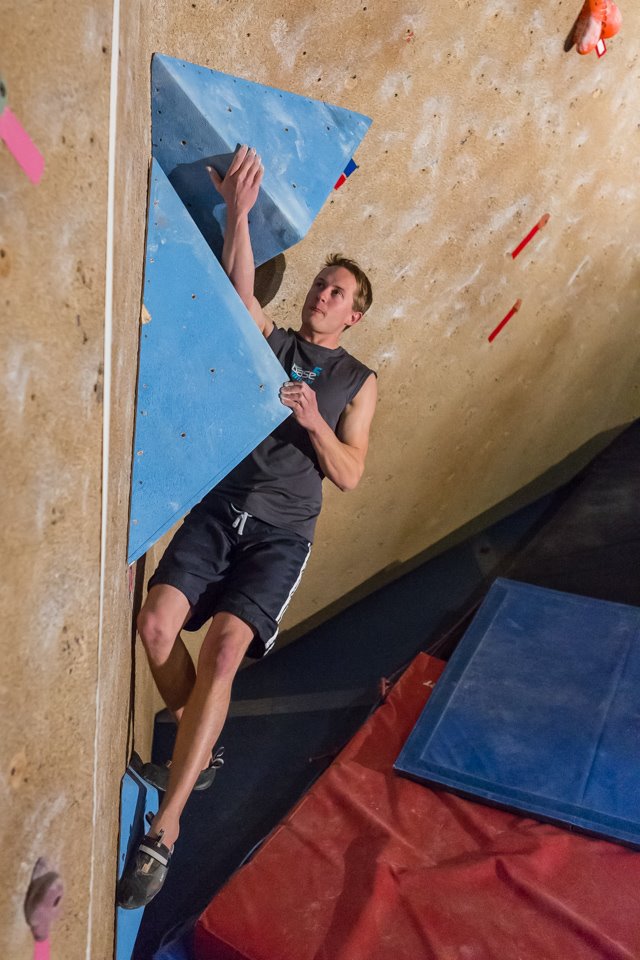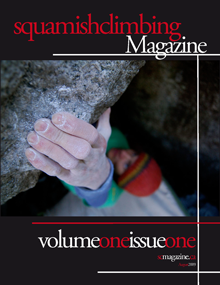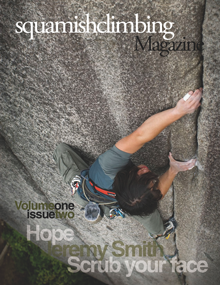With the SCBC Provincial Bouldering Competition taking place at The Edge Climbing Centre this weekend, Miranda Guzzo had a chance to sit down with Jesse Taplin to talk about training and climbing. For those who don’t know, Jesse Taplin is a climber out of Mission, BC who trains at Climb Base5 in Coquitlam, BC. He recently placed first in the Triple Header this month and was the Provincial Champion last year. Jesse is also no stranger to outdoor climbing, sending The Worm Turns (v11) this year in Joe’s Valley and having sent a few tough boulders in Squamish, such as Primal Urge (v10) and Worm World Cave Low (v10).
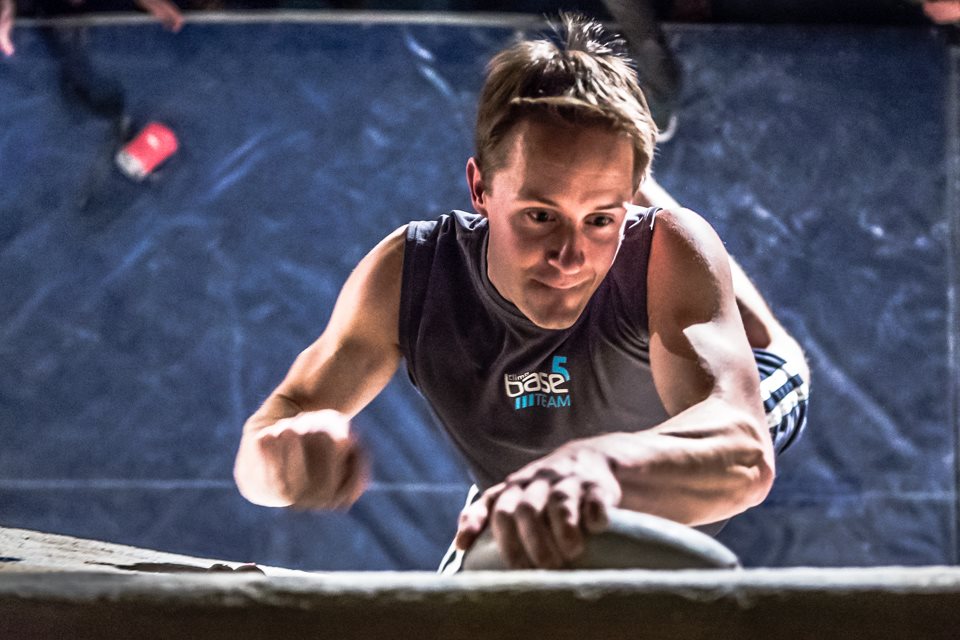
Jesse Taplin floating up the wall at Climb Base 5. Photo courtesy of Shane Murdoch ©
The following interview was conducted by Miranda Guzzo. Hi Jesse, thanks for chatting with us. How are you feeling going into this weekend’s competition?
I feel pretty good about my chances, at least based on my performance thus far. I mean, it is a National Series Competition, so you never know who might show up from out of province to try and gain a few extra points, but you can’t psych yourself out over something like that. The best thing I can do is to keep training and leave as little to chance as possible and that’s what I have been doing.
As with the Triple Header, Simon Parton is setting the problems for this event. Does this give you an advantage, knowing a routesetter’s style from previous competitions?
The fact that I know the gym and the setting style quite well definitely helps but Simon is a great setter and he can still come up with something that’ll make you stop and wonder. In those situations, I just have to go with it and usually the moves make sense once I’m on the wall. I’ve learned to leave the expectations to everyone else. For me, each event is something new and I have to approach them all with a clear and present mind.
Can you tell us what you have been focused on this year?
Well, this past Fall I took a trip down to Joe’s Valley in Utah. It was there that I did a V11 called ‘The Worm Turns,’ which is the hardest grade I’ve climbed thus far. It was actually one of the main reasons I went back to the area, this great tufa pinch on an overhang that you kind of wrestle around on, so that was pretty awesome.
For competing, having the ability make finals and actually place well on a regular basis is a big thing for me; for the previous years of being in Open (category) it was pretty hit-or-miss, but circumstances lately have been favourable. I try to not take it all too seriously, but it’s still a nice way to measure one’s progress.
Do you have any big goals this upcoming season?
Making it out to any World Cup would be a huge accomplishment for me, but first I have to qualify for the national team and I know that there are a lot of strong competitors in Canada. This is my first year of really dedicated training so we’ll see if it’s enough. Even going to Nationals in Montreal is a first for me and a big step in (hopefully) the right direction.
Outdoor climbing has always been funny for me. I can have as many aspirations as I want, but usually the stuff that actually pans out is nowhere near what I had in mind. I can say I’ve got a few V11s in Squamish I’d like to send this summer –there’s even a few 10s that have eluded me- but whether I get all, some, or none of them, I’ll probably find something new that’ll give me a good time. Part of the problem is that I don’t enjoy projecting. If I have to spend more than an hour at a time on something, I’ll move on, so finishing anything really hard could take me weeks.
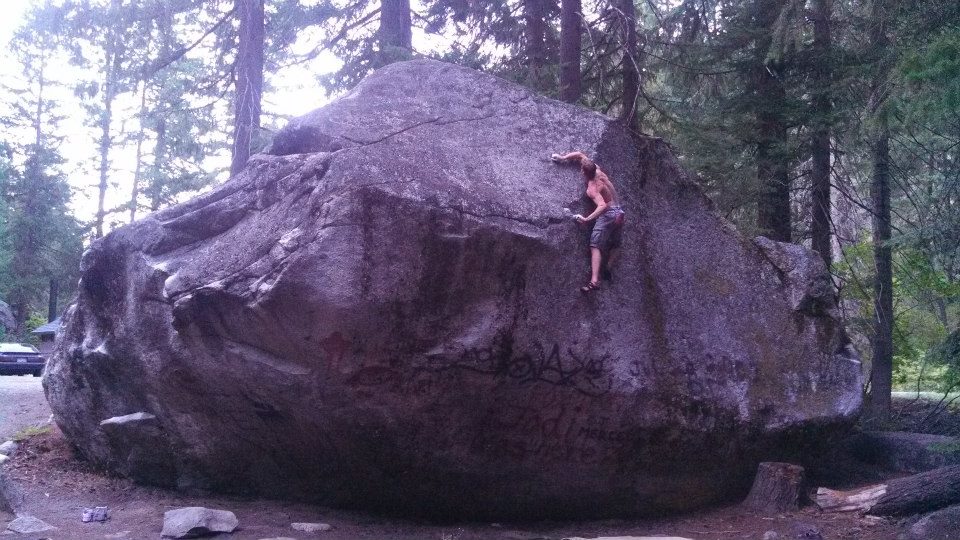
Jesse on Raven (v9) outside of Leavenworth, WA. Photo by Nicola Williams ©
Can you tell us about your first roadtrip outdoors?
My first road trip was in August of 2007. I started working at a roofing company to save up some money for the trip and once I realized I had more than enough saved, I quit. Three friends and I were California-bound and the big destination was Yosemite National Park. To go bouldering. Yeah, I know; we went to the birthplace of the North American climbing scene to scramble up a bunch of pebbles under El Cap. That was our thing at the time and I’m still kind of proud of the fact that we didn’t rope up even once.
The park is amazing. The numerous iconic views are stunning in real life, even if the waterfall was bone-dry, because it was so hot. I’m talking 35c in the shade and we wore nothing but shorts for a week straight. We eventually wandered further south to L.A., but while we were in Yosemite the whole experience so new and incredible for me that certain moments are sharply embedded in my memory. The climbing, the Giant Sequoias, the bears in the campground and the walks through the meadow staring up at the night sky; all of these things and more make it one of the best trips I’ve ever been on.
Lets talk a little about training. Do you have any training tips that you currently implementing?
Cut back to half a bag of chips, eat only once piece of cake, and do push-ups while watching movies, haha. Actually, the last one does apply, sort of. Pull-ups work too. I can say that one of the most important parts of competition training is learning how to read the routes. Not just reading and understanding them, but also seeing how you could potentially bend the intended sequence to your advantage. Climbing at other gyms is a big help for that because, ideally, you’ve never seen the problems before so it’s a good testing ground. I like to warm up, pick five climbs in my redpoint range and thoroughly map them out. Maybe I can find a way to eliminate a couple of moves or skip the hard sequence. Then I give myself a maximum number of attempts and a time limit and go at it. Also, try getting used to trusting that your body knows what it wants to do. It will naturally shift in to the best position for a move. You might find your body has a thing or two to teach you about movement if you can clear your mind long enough to surrender control. Apart from that, just stay focused I guess.
How often do you train in the gym?
I’m at the climbing gym three days per week, usually for two-to-three hours per session. While I’m there, I climb for the first while, usually bouldering but I throw in some rope every so often, and the rest of the time I spend on the hangboard and the campus rungs. I’m generally working to improve my finger strength, or my contact strength, or my lock-off ability, or just about anything else I think I need to be better at. When I’m at the gym I try to focus on fingery stuff, if only because they have the proper equipment for it.
Do you do anything beside climbing to stay strong?
My other training only consists of an hour or so at home on the evenings when I’m not climbing. It involves a very basic workout for pull and lock-off, core, conditioning; that sort of thing. Antagonistic muscles usually factor in so I don’t pull something out of alignment. I should probably take up running again now that I spend more time at a desk for work, but after doing the Vancouver Marathon a couple of years ago running kind of lost its appeal.
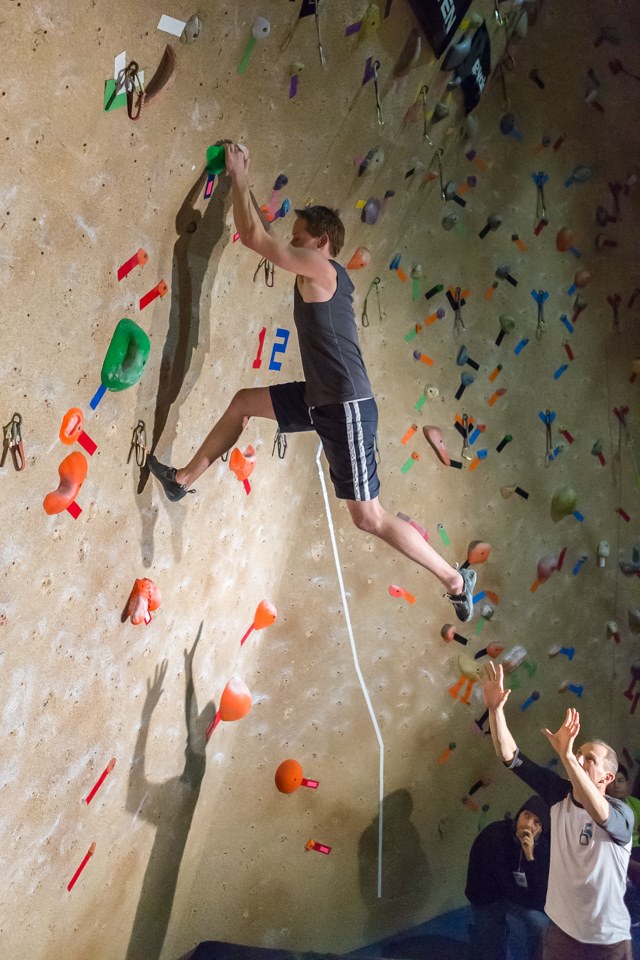
Photo courtesy of Shane Murdoch ©
Biggest Weakness?
Crimps. Especially sideways crimps. And especially if I have to undercling off of or cross to/from a sideways crimp. I think I’d rather chew my own fingers off. I’ll pinch at
every opportunity, I’ll grovel on slopers until my arms hurt, but when it comes to thin edges my fingers just say no.
In your opinion, what’s the biggest challenge climbing is facing right now?
I know what I want to say, but not how to say it, so I’ll just give it my best shot. I think the biggest challenge for climbing right now is also its greatest strength: Understanding, or a lack thereof. This thing we do is only comparable to sports like running, or cycling, or surfing; things that are a challenge only for the individual who is participating. Anyone who does not have a passion for a particular sport will never understand why someone would choose to run multiple marathons, or do the Tour de France, or try to surf the biggest wave. But it is impressive when they do well, even if we don’t really know how they do so well. Being kindred spirits though, at least of a sort, I think we as climbers can understand the passion those people feel for what they do, because anyone we could truly call a climber has that same passion. I don’t know if the rest of the world has reached that level of understanding yet.
For example, Do I think climbing should be in the Olympics? Yes. Absolutely yes. Probably more so even than sports like baseball or hockey, if only because it’s not rife with overpaid athletes. Do I think people will follow the climbing as closely as the other sports? Probably not. Only climbers really watch and follow other climbers. But it gives us something else to strive for, it is a showcase for what we do, and it’s one more way we can challenge ourselves and heighten our sense of community. I don’t think climbing
will ever be a mainstream sport, but I think it’s better that way.
Any advice for the next generation of climbers?
Have fun! Climbing is nothing without the joy that comes from accomplishing something, no matter how small. Put aside all of the expectations from yourself or others and don’t worry about whether or not you’re good enough or coordinated enough or strong enough. In climbing there are always challenges. You’ll work through one problem and come up against another. This fact applies to all aspects of the activity; sport, trad, bouldering and ice climbing, will all have their own unique issues and they will all have something to do with your mind and your body. The great part is that both of those things are under your control, so there is no reason why you can’t excel at whatever you want to do. Embrace the learning process. Accept the challenge. Enjoy the experience. You can do all of that from the first day. Everything else, well, that comes with time.
Final words?
Just a quick nod to the other gyms that have helped me grow as a climber over the years: The Rock Wall in Maple Ridge, where I first started as a quiet, scrawny 14-year-old, and Project Climbing Center in Abbotsford, where I was no longer scrawny but still pretty quiet. 11 years in the sport has had a great influence on who I am today and a large part of that influence is owed to the people I’ve met along the way, all of them through climbing. I wouldn’t change any of it.
Thanks Jesse. All the best this weekend. Stay tuned to Squamish Climbing Magazine for the results for this weekend and a wrap up next week. Special thanks to Miranda Guzzo for conducting the interview with Jesse and to Shane Murdoch for his photos.
